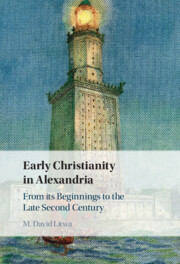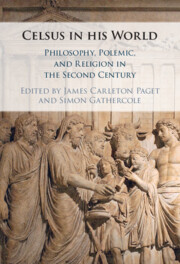Refine search
Actions for selected content:
14 results
Chapter 2 - Nutrition, Growth and Vegetative Capacities
-
- Book:
- Galen on Human Physiology
- Published online:
- 28 July 2025
- Print publication:
- 02 October 2025, pp 56-87
-
- Chapter
- Export citation

Early Christianity in Alexandria
- From its Beginnings to the Late Second Century
-
- Published online:
- 14 December 2023
- Print publication:
- 21 December 2023
Chapter 2 - The Idea of the Good
-
- Book:
- Plato's Moral Realism
- Published online:
- 28 July 2023
- Print publication:
- 24 August 2023, pp 29-74
-
- Chapter
- Export citation
Chapter 4 - In the Spirit of Plato
-
-
- Book:
- The Cambridge Companion to Plutarch
- Published online:
- 29 June 2023
- Print publication:
- 13 July 2023, pp 79-100
-
- Chapter
- Export citation
15 - Cosmology and Human Nature in the Timaeus
-
-
- Book:
- The Cambridge Companion to Plato
- Published online:
- 21 July 2022
- Print publication:
- 04 August 2022, pp 464-492
-
- Chapter
- Export citation
5 - Origen’s Celsus and Imperial Greek Religiosity
-
-
- Book:
- Celsus in his World
- Published online:
- 18 November 2021
- Print publication:
- 25 November 2021, pp 149-186
-
- Chapter
- Export citation
4 - Celsus’ Theology
-
-
- Book:
- Celsus in his World
- Published online:
- 18 November 2021
- Print publication:
- 25 November 2021, pp 127-148
-
- Chapter
- Export citation

Celsus in his World
- Philosophy, Polemic and Religion in the Second Century
-
- Published online:
- 18 November 2021
- Print publication:
- 25 November 2021
Chapter 4 - The World Soul Takes Command
-
-
- Book:
- Cosmology and Biology in Ancient Philosophy
- Published online:
- 21 May 2021
- Print publication:
- 10 June 2021, pp 72-84
-
- Chapter
- Export citation
Chapter 5 - Begotten and Made
-
-
- Book:
- Cosmology and Biology in Ancient Philosophy
- Published online:
- 21 May 2021
- Print publication:
- 10 June 2021, pp 85-100
-
- Chapter
- Export citation
Chapter 2 - Music and Plutarch’s Platonic Cosmos
-
-
- Book:
- Music and Philosophy in the Roman Empire
- Published online:
- 27 November 2020
- Print publication:
- 17 December 2020, pp 38-59
-
- Chapter
- Export citation
Chapter 7 - God and Gods
- from Part Two
-
- Book:
- Calcidius on Plato's <I>Timaeus</I>
- Published online:
- 18 September 2020
- Print publication:
- 24 September 2020, pp 85-98
-
- Chapter
- Export citation
Chapter 13 - Gnosticism
- from Part III - Intellectual Contexts
-
-
- Book:
- Cormac McCarthy in Context
- Published online:
- 12 December 2019
- Print publication:
- 02 January 2020, pp 132-142
-
- Chapter
- Export citation
23 - Hierocles of Alexandria
- from IV - Philosophy in the age of Constantine
-
-
- Book:
- The Cambridge History of Philosophy in Late Antiquity
- Published online:
- 28 May 2011
- Print publication:
- 01 January 2000, pp 437-456
-
- Chapter
- Export citation
